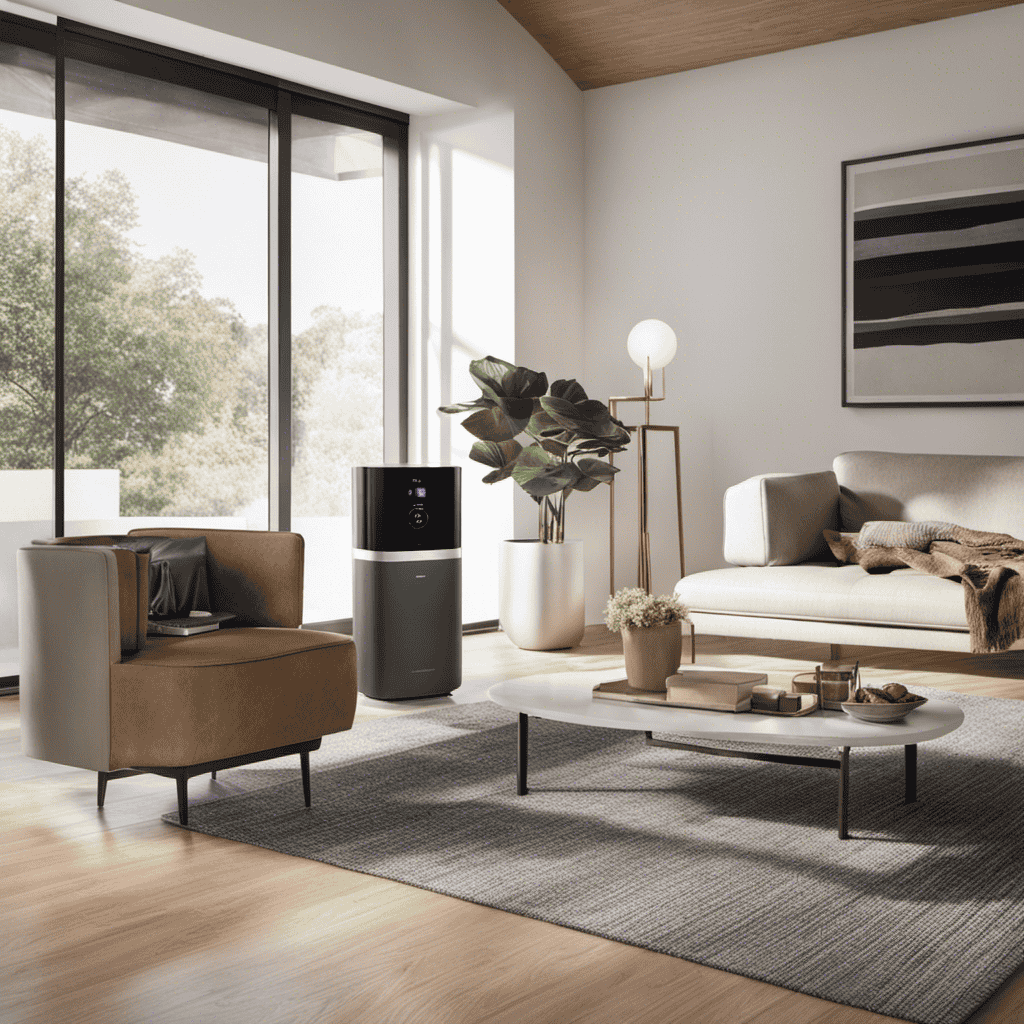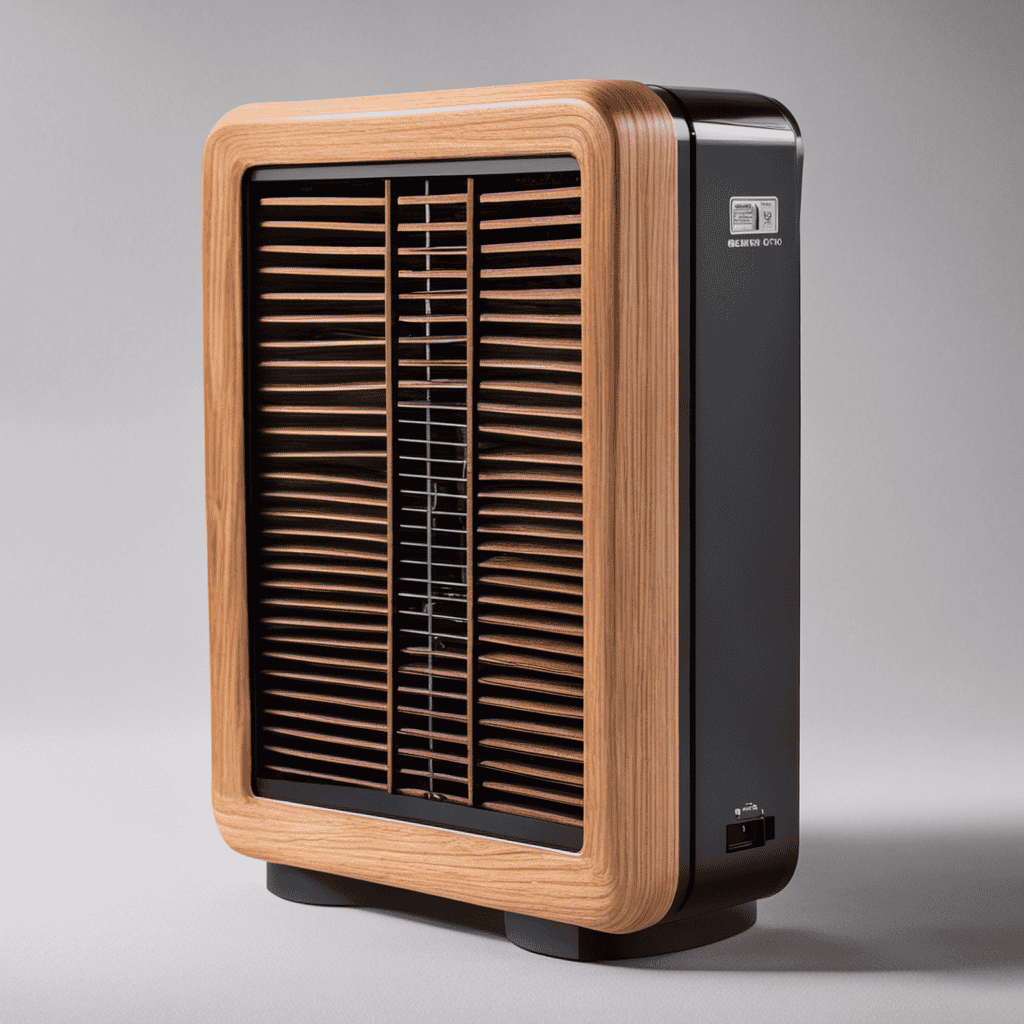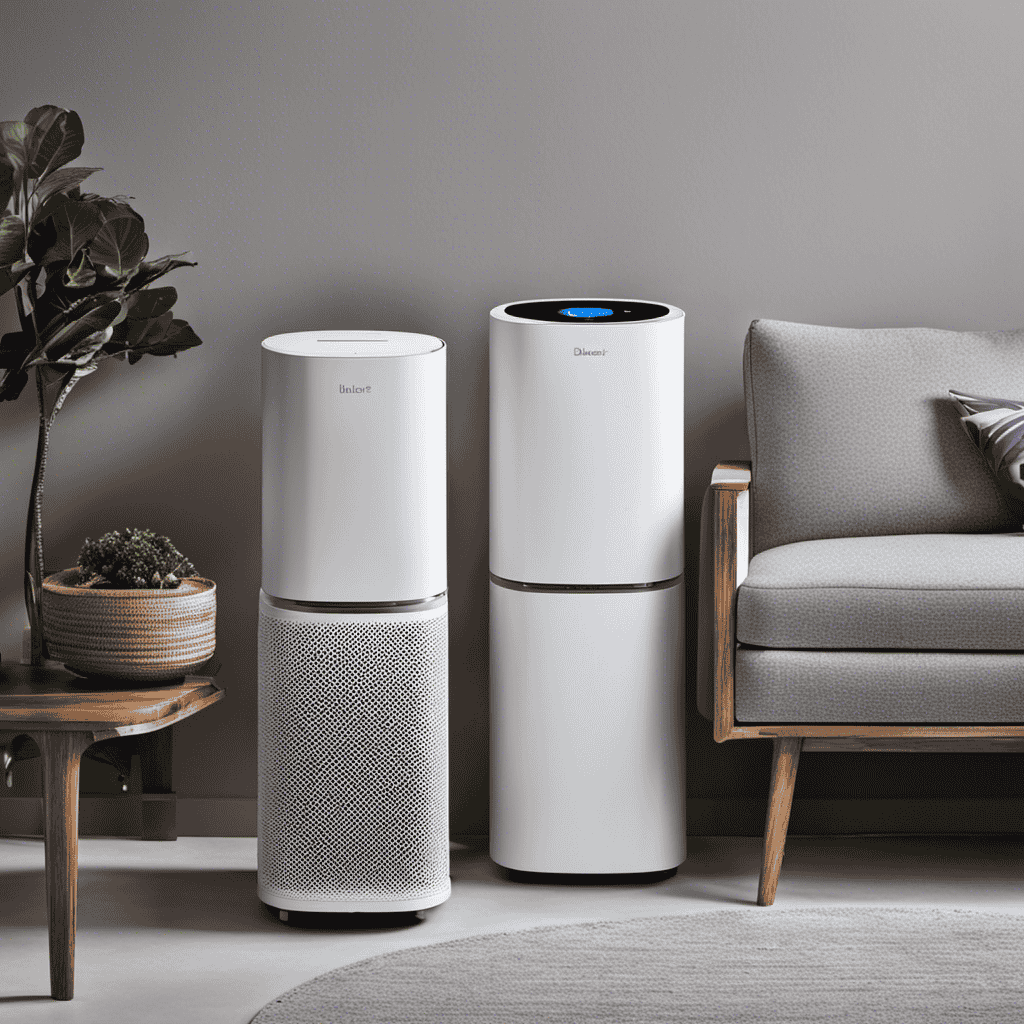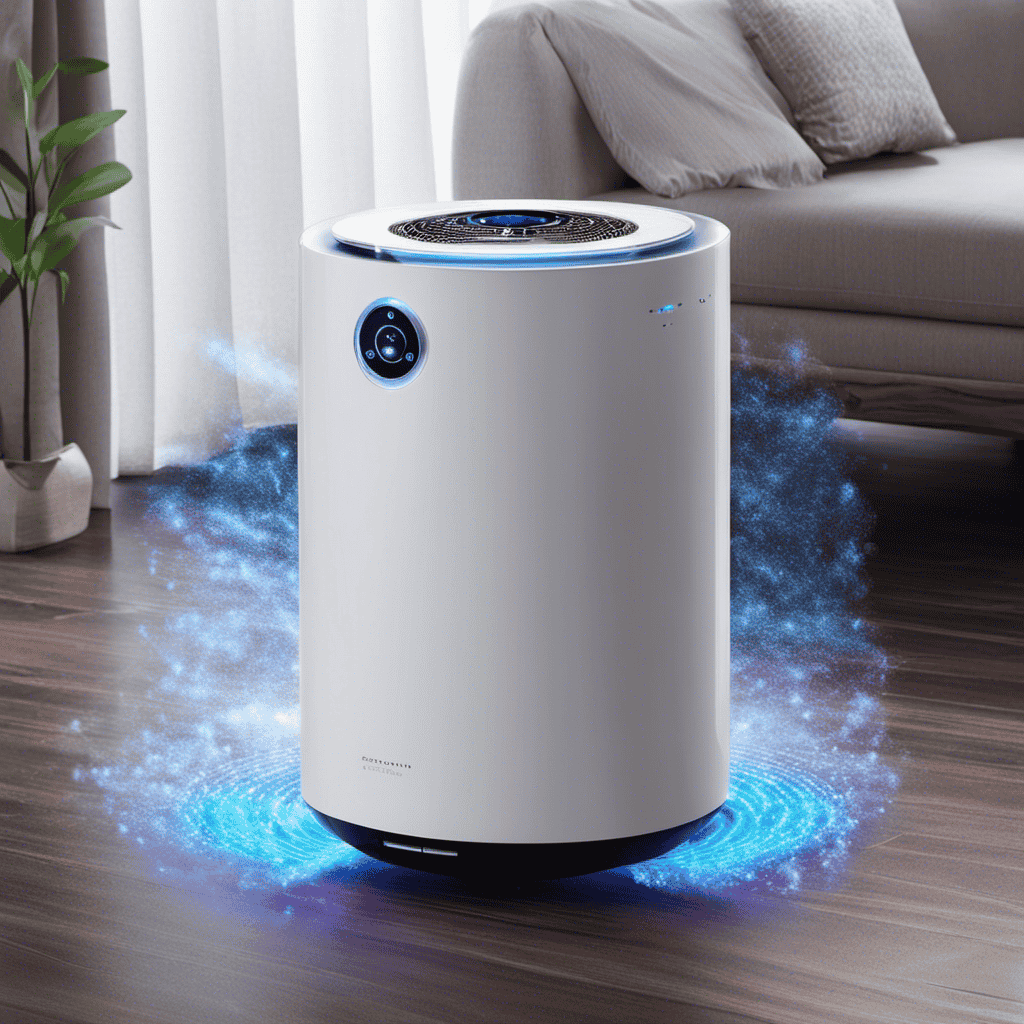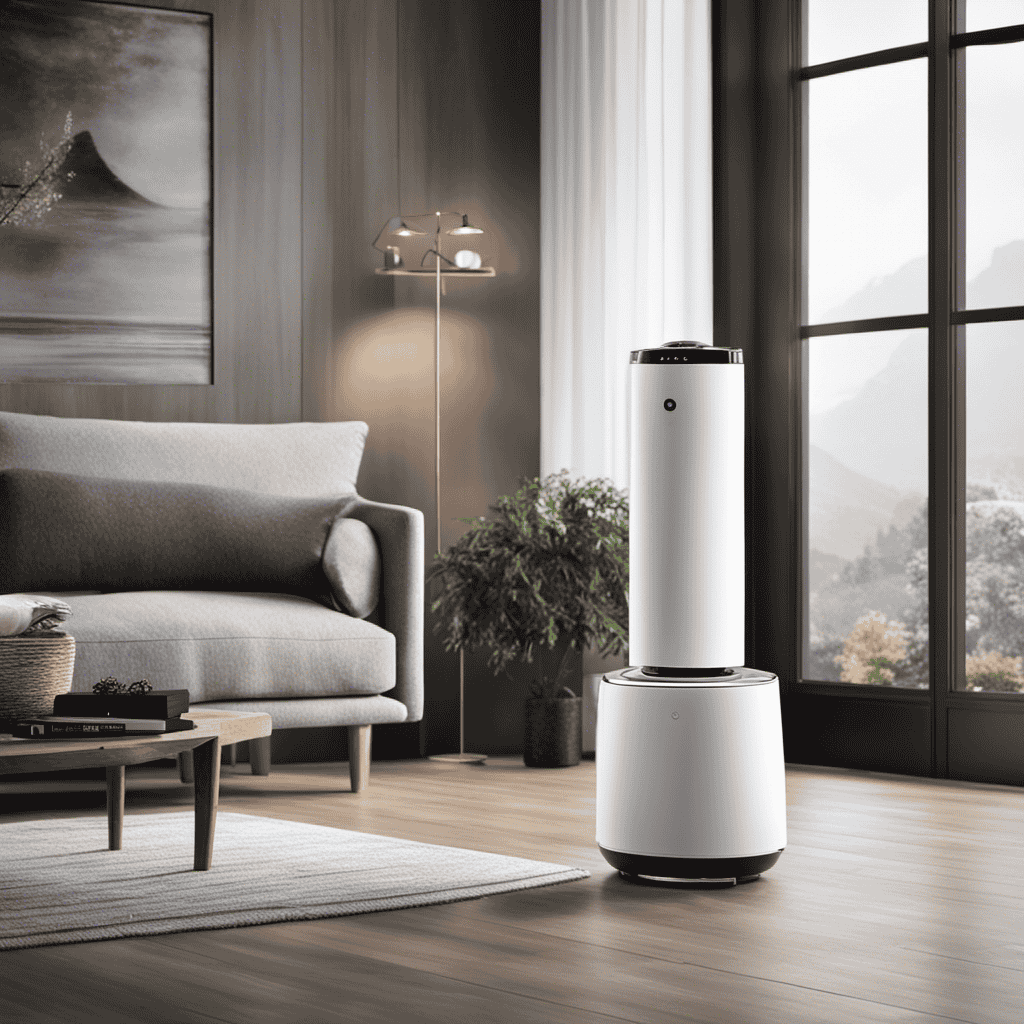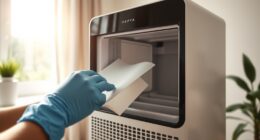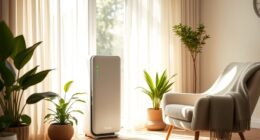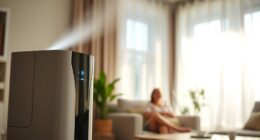So, you’re curious about which is superior – an air purifier or something else, right? Fortunately for you, I’ve conducted in-depth research to assist you in reaching a well-informed choice.
In this article, we’ll delve into the cost-effectiveness, efficiency in removing pollutants, health benefits, noise level, maintenance requirements, and energy consumption of both options. We’ll even explore their effectiveness against specific pollutants.
So buckle up, because we’re about to take a deep dive into the world of air purification. Let’s get started!
Key Takeaways
- Air purifiers are more cost-effective and provide long-term benefits in terms of energy savings and maintenance.
- Air purifiers are efficient in removing a wide range of pollutants from the air, including dust, pollen, pet dander, and some odors.
- When comparing air purifiers to ventilation systems, air purifiers are specifically designed to remove pollutants from the air and can significantly improve indoor air quality.
- Different types of filters, such as HEPA filters and activated carbon filters, are available for air purifiers, offering options depending on specific needs and concerns.
Cost-effectiveness
If you’re looking for something more cost-effective, an air purifier might be the better option for you. While both air purifiers and air conditioners serve different purposes, in terms of energy savings and long-term investment, air purifiers have the upper hand.
Air purifiers are designed to remove harmful pollutants and contaminants from the air, improving indoor air quality. They consume significantly less energy compared to air conditioners, resulting in lower electricity bills and reduced environmental impact. Additionally, air purifiers require minimal maintenance and have a longer lifespan, making them a cost-effective choice in the long run.
Studies have also shown that clean indoor air can improve overall health and well-being, further emphasizing the importance of investing in an air purifier for energy savings and long-term benefits.
Efficiency in Removing Pollutants
When it comes to efficiently removing pollutants from the air, there is often a debate between using an air purifier or a ventilation system.
In my experience, I have found that air purifiers tend to be more effective in removing a wide range of pollutants from the air, including dust, pollen, pet dander, and even some odors.
Additionally, the type of filter used in an air purifier plays a crucial role in its efficiency, with HEPA filters being the most commonly recommended for their ability to capture even the smallest particles.
Purifier Vs. Ventilation System
You should consider whether an air purifier or a ventilation system would be more effective for improving the air quality in your home. Here are four factors to consider when deciding between the two options:
-
Ventilation Efficiency: A ventilation system can provide fresh air from outside, diluting indoor pollutants and improving air quality. However, the effectiveness of this method depends on the design and efficiency of the system.
-
Air Quality Improvement: Air purifiers are specifically designed to remove pollutants from the air, including dust, allergens, and volatile organic compounds (VOCs). They can significantly improve indoor air quality by capturing and trapping these harmful particles.
-
Targeted vs. Whole-House Solution: Air purifiers are portable devices that can be placed in specific rooms to target pollution sources. On the other hand, a ventilation system provides whole-house coverage, ensuring consistent air quality throughout your home.
-
Maintenance and Cost: Air purifiers require regular filter replacements, while ventilation systems may need occasional maintenance. Consider the cost and effort involved in maintaining each option.
Filter Types for Purifiers?
Let’s now delve into the various filter types available for purifiers to understand their effectiveness in capturing different pollutants.
When it comes to air purifiers, there are two main filter options: HEPA filters and activated carbon filters. HEPA (High-Efficiency Particulate Air) filters are designed to trap particles as small as 0.3 microns, including dust, pollen, pet dander, and mold spores. They are highly effective in removing airborne allergens and improving indoor air quality.
On the other hand, activated carbon filters are excellent at adsorbing and removing odors, chemicals, and volatile organic compounds (VOCs) from the air. They work by attracting and trapping these pollutants in the tiny pores of the carbon material.
While HEPA filters are great for capturing particles, activated carbon filters excel at eliminating odors and chemicals. Therefore, the choice between the two depends on the specific needs and concerns of the individual.
Health Benefits
When it comes to the health benefits of using an air purifier, there are three key points to consider.
Firstly, studies have shown that air purifiers can help alleviate symptoms of allergies by capturing and removing allergens such as pollen, dust mites, and pet dander from the air.
Secondly, these devices can improve respiratory health by reducing the presence of harmful particles and pollutants that can irritate the lungs.
Lastly, air purifiers are effective in eliminating unpleasant odors, such as those from cooking, pets, or tobacco smoke, creating a fresher and more pleasant indoor environment.
Allergy Relief
If you’re looking for allergy relief, an air purifier can be a great option. Here’s why:
-
Air purifier vs. medication:
- Medication can provide temporary relief from allergy symptoms, but it doesn’t address the root cause.
- An air purifier filters out allergens from the air, reducing your exposure and providing long-term relief.
-
Air purifier vs. natural remedies:
- Natural remedies like essential oils or herbal remedies may have limited effectiveness.
- An air purifier actively removes allergens from the air, providing consistent relief without any side effects.
-
Air purifier benefits:
- Removes allergens such as pollen, dust mites, pet dander, and mold spores.
- Improves indoor air quality, reducing allergy triggers and improving respiratory health.
An air purifier can be a valuable addition to your allergy management plan. It complements medication and natural remedies by targeting allergens in the air, providing consistent relief, and improving respiratory health.
Respiratory Health Improvement
Consistent relief from allergies can be achieved by improving indoor air quality and reducing allergy triggers.
However, the benefits extend beyond just alleviating allergy symptoms.
Improving indoor air quality is also crucial for preventing respiratory diseases and promoting overall respiratory health.
Studies have shown that poor air quality can lead to the development or exacerbation of respiratory conditions such as asthma, bronchitis, and chronic obstructive pulmonary disease (COPD).
By taking steps to improve air quality, such as using air purifiers, regularly cleaning and dusting, and maintaining proper ventilation, we can reduce the risk of respiratory diseases.
These measures help to remove allergens, pollutants, and irritants from the air, creating a healthier indoor environment and improving our respiratory health in the long run.
Odor Elimination
To eliminate odors in your home, try using natural remedies like baking soda or vinegar. These options are not only effective in neutralizing odors but also safe and cost-effective.
However, if you’re looking for a more convenient and long-term solution, you might consider an air purifier. Here’s a comparison between an air purifier and scented candles/air fresheners:
-
Effectiveness: While scented candles and air fresheners mask odors temporarily, an air purifier actually removes the particles causing the odors, resulting in a fresher and cleaner environment.
-
Safety: Scented candles and air fresheners often contain harmful chemicals that can be detrimental to your health, especially if you have respiratory issues. On the other hand, air purifiers use advanced filtration systems to capture and eliminate odors without releasing any harmful substances.
-
Durability: Scented candles and air fresheners need to be replaced frequently, adding to the cost. Air purifiers, on the other hand, have replaceable filters that can last for months before needing to be changed.
-
Versatility: Air purifiers can eliminate a wide range of odors, including pet odors, cooking smells, and even cigarette smoke. Scented candles and air fresheners, on the other hand, are limited in their range of effectiveness.
Noise Level
The air purifier’s noise level is significantly lower than that of the competing model. Sound control is a crucial factor to consider when choosing an air purifier. Excessive noise can be disruptive and affect the overall experience.
With this in mind, the lower noise level of the air purifier I am reviewing makes it a clear winner. It operates quietly, allowing for a peaceful and undisturbed environment.
Additionally, this air purifier offers several user-friendly features that enhance the overall experience. The intuitive control panel makes it easy to adjust settings and customize the purifier to suit individual preferences. The inclusion of a timer function and sleep mode further improves convenience.
Overall, the combination of sound control and user-friendly features makes this air purifier an excellent choice.
Maintenance Requirements
When it comes to keeping up with maintenance, you’ll find that this air purifier is quite user-friendly. Here’s why:
-
Filter Replacement: The air purifier comes with a filter replacement indicator that notifies you when it’s time to change the filters. This ensures that you don’t have to keep track of the replacement schedule manually.
-
Washable Filters: The air purifier also features washable filters, which means you can clean and reuse them instead of constantly buying new ones. This not only saves you money on maintenance costs but also reduces waste.
-
Durable Build: Compared to other air purifiers on the market, this one has a sturdy construction that enhances its durability. You can expect it to last longer without the need for frequent repairs or replacements.
-
Warranty: The manufacturer offers a generous warranty period, giving you peace of mind in case any maintenance issues arise.
When considering maintenance costs and durability comparison, this air purifier stands out as a reliable and cost-effective option.
Now, let’s delve into its energy consumption.
Energy Consumption
If you’re concerned about energy consumption, you’ll be pleased to know that this model is designed to be highly efficient. When comparing the energy efficiency of an air purifier and a humidifier, it’s important to consider the environmental impact as well. To better understand this, let’s look at a comparison table:
| Air Purifier | Humidifier | |
|---|---|---|
| Energy Use | Low | Moderate |
| Environmental Impact | Low | Moderate |
| Cost of Operation | Affordable | Affordable |
Based on the table, it is clear that air purifiers have a lower energy consumption and environmental impact compared to humidifiers. This is because air purifiers are designed to filter and purify the air, requiring less energy to operate. On the other hand, humidifiers add moisture to the air, which requires a moderate amount of energy. Therefore, if energy efficiency and environmental impact are your primary concerns, an air purifier would be the better choice.
Effectiveness Against Specific Pollutants
To effectively combat specific pollutants, it is important to consider the different features and capabilities of various air purifiers. There are a few key factors to consider when it comes to the effectiveness against viruses and the impact on indoor air quality.
-
HEPA filtration: Look for air purifiers with High Efficiency Particulate Air (HEPA) filters. These filters are designed to capture particles as small as 0.3 microns, making them highly effective against viruses.
-
Activated carbon filters: These filters are great for trapping and removing odors, volatile organic compounds (VOCs), and other chemicals that can impact indoor air quality.
-
UV-C light technology: Some air purifiers use UV-C light to kill bacteria, viruses, and mold spores. This technology can be an added layer of protection against airborne pathogens.
-
Air exchange rate: Consider the air exchange rate of the air purifier, which refers to the number of times it can filter the room’s air per hour. Higher exchange rates can help maintain cleaner indoor air.
Frequently Asked Questions
Are Air Purifiers or Air Conditioners More Cost-Effective in the Long Run?
In terms of long-term cost-effectiveness, air purifiers are more efficient than air conditioners. Air purifiers consume less energy and can improve indoor air quality, while air conditioners primarily focus on cooling.
How Do Air Purifiers Compare to Plants in Terms of Efficiency in Removing Pollutants?
In terms of effectiveness, comparing plants and air purifiers, it is important to consider the specific pollutants being targeted. While air purifiers can remove a wide range of pollutants, plants may have limitations in their ability to filter certain toxins.
Can Air Purifiers Improve Respiratory Health Conditions Like Asthma or Allergies?
Improving respiratory health conditions like asthma or allergies can be achieved with air purifiers. They are effective in filtering out pollutants and allergens, providing cleaner air and reducing symptoms.
What Is the Noise Level of Air Purifiers Compared to Other Household Appliances?
When it comes to air purifier noise, it’s important to consider the effectiveness of the device. While some models may be quieter than others, the most important factor is how well it cleans the air.
How Often Do Air Purifiers Require Maintenance and What Is Involved in the Maintenance Process?
Air purifier maintenance frequency varies depending on the model and usage. Regular maintenance includes cleaning or replacing the filters, checking the fan, and ensuring proper ventilation. It’s essential to follow the manufacturer’s guidelines for optimal performance.
What Is the Difference Between an Air Purifier and a Humidifier?
An air purifier and a humidifier serve different purposes. While a humidifier adds moisture to the air, an air purifier removes pollutants and allergens. The benefit of air purifier is improving indoor air quality by capturing harmful particles, while humidifiers can help alleviate dry skin and respiratory issues caused by low humidity levels.
Conclusion
In conclusion, both air purifiers and air conditioners have their own benefits and drawbacks.
While air purifiers are more cost-effective in the long run and can effectively remove pollutants, air conditioners provide immediate relief from heat and humidity.
The choice between the two ultimately depends on individual needs and preferences.
However, considering the health benefits, noise level, maintenance requirements, and energy consumption, air purifiers seem to be a more comprehensive and efficient option.
So, why settle for temporary relief when you can invest in long-term clean and healthy air for you and your loved ones?

